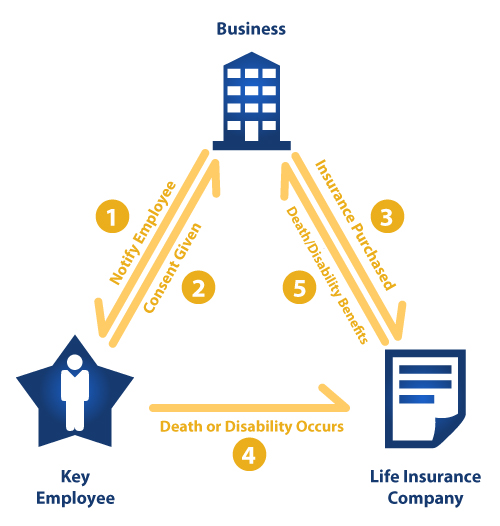Business Planning
Advantages of a Buy Sell Agreement
 A buy sell plan can provide numerous advantages to the estate of a deceased business owner, to a retiring or disabled owner and to the remaining surviving partner(s) or co-shareholder(s). Some of the important advantages are:
A buy sell plan can provide numerous advantages to the estate of a deceased business owner, to a retiring or disabled owner and to the remaining surviving partner(s) or co-shareholder(s). Some of the important advantages are:
- Provides continuity of management by requiring the estate to sell the decedent’s interest in the company to the surviving owner(s) of the business. There will be no unexpected or unwanted owners; the business will be maintained by the surviving owner(s).
- Provides the estate with needed liquidity by converting unmarketable stock to cash. The cash can be used to settle a decedent’s estate and establish an income stream to the beneficiaries. Generally, it is unlikely that an estate could sell an interest in a closely held business on the open market for a fair price. The buy sell agreement creates a certain market for the stock at a fair price.
- Provides a fair and reasonable price for the business. The purchase price is established by the parties to the agreement during life. It is more likely that a fair price will be negotiated.
- Provides a method of pegging the value of a decedent’s interest for federal estate tax purposes. Generally, the IRS will accept the buy out price as the value of the decedent’s business interest for federal estate tax purposes if:
- The agreement is an arm’s length transaction;
- The price is fair and reasonable at the time the agreement is entered into; and
- The agreement prohibits the parties from selling or giving away the stock to anyone without first offering the other parties an option to purchase at a price no higher than the price at death.
- Note that buy-sell agreements between family members (including siblings) are also subject to the rules of Chapter 14 of the Internal Revenue Code.
Key Person
 Most business owners recognize that profits are made by people, not machines. Hence, these business owners recognize the necessity of accumulating funds to protect against the loss of their most talented and valuable people. Key employee life insurance is the one way to produce the desired amount of cash at the precise moment it is needed – upon the death or disability of the employee.
Most business owners recognize that profits are made by people, not machines. Hence, these business owners recognize the necessity of accumulating funds to protect against the loss of their most talented and valuable people. Key employee life insurance is the one way to produce the desired amount of cash at the precise moment it is needed – upon the death or disability of the employee.
What’s a Key Employee?
Do you have employees that exhibit the following characteristics?
- Have unique management skills, experience and leadership to drive top line growth and manage bottom line expenses;
- Possess valuable relationships with key clients and centers of influence;
- Have specialized skills, training or abilities that would make replacing them very difficult, time consuming and expensive.
If this sounds familiar, then these are key employees who should be insured by the business. In many cases, the key employee can even be you, as the business owner.
The amount of insurance coverage required will vary according to many factors. Some of those factors include: effect of the key employee on the potential loss of revenue and profits; business debt obligations directly impacted by the employee’s productivity; the cost to hire and train a replacement for the key employee; some multiple of the key employee’s present salary; and others.

How Does it Work?
- The business notifies the key employee that life insurance (and/or disability insurance) will be purchased on the key employee’s life and the employee consents to the insurance.
- The business is the applicant, owner, premium payor and beneficiary of the policy.
- For permanent life insurance, while the policy is in-force, its cash value can provide the business with a reserve that can be accessed via loans and withdrawals.
- In the event the key employee dies, the policy’s benefits are paid directly to the business. If the employee becomes disabled and the business protected itself with key employee disability insurance, then the disability policy’s benefits are paid directly to the business.
Advantages of Key Person Insurance
- Provides the business with a source of funds at exactly the moment it is needed, when a key employee dies or becomes disabled, to pay off loans, hire a replacement, meet expense obligations, etc.
- The insurance policies are assets of the business, and for permanent life insurance, the cash values can provide a source of funds for collateral business uses, such as providing for benefits obligations, and redeeming the business interest of a deceased or disabled owner.
- Banks, creditors and valued partners can be assured that the business will continue uninterrupted in the event of the insured’s death or disability.
Tax Considerations
- Life insurance and disability insurance premiums are not deductible by the business.
- There are no tax consequences to the employee unless some benefit is paid to the employee or the employee’s estate.
- Insurance proceeds are received income tax-free by the business.
- If the business is a C corporation, the death proceeds and cash value increases could in certain cases be subject to alternative minimum tax.
- In pass-through entities such as S corporations, LLC’s and partnerships, the death proceeds increase the basis of the owner’s business interest. Premium payments, policy cash values and policy dividends may also impact an owner’s basis.
Pension Plan
 A type of retirement plan, usually tax exempt, wherein an employer makes contributions toward a pool of funds set aside for an employee’s future benefit. The pool of funds is then invested on the employee’s behalf, allowing the employee to receive benefits upon retirement.
A type of retirement plan, usually tax exempt, wherein an employer makes contributions toward a pool of funds set aside for an employee’s future benefit. The pool of funds is then invested on the employee’s behalf, allowing the employee to receive benefits upon retirement.
In many ways, a pension plan is a method in which an employee transfers part of his or her current income stream toward retirement income. There are two main types of pension plans: defined-benefit plans and defined-contribution plans.
In a defined-benefit plan, the employer guarantees that the employee will receive a definite amount of benefit upon retirement, regardless of the performance of the underlying investment pool.
In a defined-contribution plan the employer makes predefined contributions for the employee, but the final amount of benefit received by the employee depends on the investment’s performance.
401(k)
A 401(k) is a retirement savings plan sponsored by an employer. It lets workers save and invest a piece of their paycheck before taxes are taken out. Taxes aren’t paid until the money is withdrawn from the account.
401(k) plans, named for the section of the tax code that governs them, arose during the 1980s as a supplement to pensions. Most employers used to offer pension funds. Pension funds were managed by the employer and they paid out a steady income over the course of the retirement.
With a 401(k), you control how your money is invested. Most plans offer a spread of mutual funds composed of stocks, bonds, and money market investments.
While a 401(k) can help you save, it has plenty of restrictions and caveats. In most cases, you can’t tap into your employer’s contributions immediately. Vesting is the amount of time you must work for your company before gaining access to its payments to your 401(k). (Your payments, on the other hand, vest immediately.) It’s an insurance against employees leaving early. On top of that, there are complex rules about when you can withdraw your money and costly penalties for pulling funds out before retirement age.









